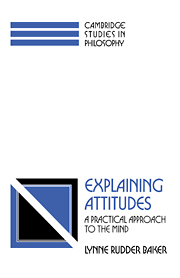1 - Two conceptions of the attitudes
Published online by Cambridge University Press: 05 June 2012
Summary
René Descartes is famous for distinguishing between “the moral mode of knowing which suffices for the regulation of life,” and “that Metaphysical mode of knowing,” which is beyond all rational doubt. The kind of knowledge that suffices for practical affairs is of little concern to Descartes's philosopher, who seeks knowledge that can be grasped with absolute certainty. Although the ideal of Cartesian certainty largely has been abandoned, many philosophers retain a two-tiered conception of knowledge: According to this conception, the knowledge pertaining to the “practical needs of life” is, at best, a kind of second-class truth that must either be validated by science or relegated to the dustbin of the merely heuristic.
Among philosophers who take “all traits of reality worthy of the name” to be exclusively in the hands of the sciences or, more generally, in the hands of a metaphysics that aspires to be scientific, there is disagreement about the extent of scientific knowledge: Are the physical sciences the only source of genuine knowledge, as Quine holds, or should sciences that appeal to generalizations not translatable into the austere notation of theoretical physics also be recognized as sources of first-class truth, as so-called nonreductive materialists hold? Either way, according to the received two-tiered view, putative truths that resist integration into scientific theory must be understood “with a grain of salt.” As Wilfrid Sellars put the received view so vividly, “In the dimension of describing and explaining the world, science is the measure of all things, of what is that it is, and of what is not that it is not.”
- Type
- Chapter
- Information
- Explaining AttitudesA Practical Approach to the Mind, pp. 3 - 31Publisher: Cambridge University PressPrint publication year: 1995

